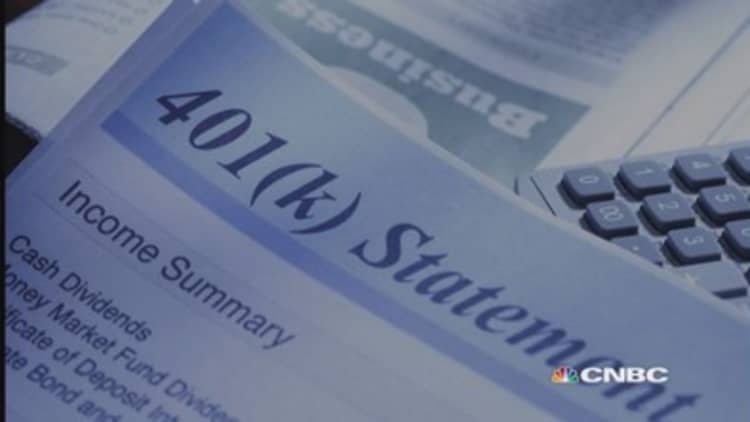


When it comes to financial literacy, you're never really done learning.
April is Financial Literacy Month, and studies still paint a grim picture about how poorly educated Americans are when it comes to managing our money. In the first large-scale international study of 15-year-old students' financial literacy skills, released last summer, the U.S. ranked at best eighth and at worst, 12th, out of 18 countries participating.
Adults haven't fared any better. In a Retirement Income Literacy Survey conducted for The American College of Financial Services last year, 80 percent of the respondents received scores of 60 or lower on financial questions about retirement. Just 20 percent received what amounted to a passing grade.
Read More8 important money questions many people can't answer
The results are just as dismal when it comes to general financial knowledge. Asked five multiple-choice questions about topics like interest calculations, mortgage payments and investments, just 39 percent of the 25,509 adults answered at least four correctly, according to a 2012 survey from the FINRA Investor Education Foundation. That was down from 42 percent in 2009. The survey is done every four years. (See chart below for a state-by-state analysis.)
Financial literacy educators say there's a way to buck the trend, and it isn't all about starting earlier. "We're stepping up our game in other parts of people's lives," said Ted Beck, president and chief executive of the National Endowment for Financial Education. "We're trying to make financial literacy more of a continuous education."
Historically, high school is where the bulk of financial literacy programs have targeted their efforts. But studies have found that the retention rate on financial lessons learned is two years at best, said Beck—a track record supported by such financial literacy test results. A comprehensive personal finance education in high school may not fully prepare someone years later to buy a home, understand his workplace benefits or save for retirement, especially with a rapidly shifting array of financial products and tools in the mix.
A decision about housing, for example, will vary by life stage and needs, said Beck. A recent college grad may need help deciding when to move out of his parents' home, while a retiree might be researching the pros and cons of a reverse mortgage. "The decisions you make vary, and the information you need varies as products change," he said.
Read MoreAmericans struggling to save
Even older adults, who have arguably learned something about personal finances by managing their own, could stand a refresher. FINRA found respondents age 55-plus got a mean 3.3 answers out of 5 correct versus 2.9 for those in the 35-to-54 age bracket and 2.3 for those 18 to 34. "There's room for improvement pretty much across the board," Gerri Walsh, president of the FINRA Investor Education Foundation, said Wednesday.
State-by-state financial literacy scores
| State | % who got 4-5<br> answers correct | Mean of correct<br> answers | Mean of I don't<br> know answers |
|---|---|---|---|
| Utah | 49% | 3.23 | 1.12 |
| Wyoming | 48% | 3.18 | 1.1 |
| Alaska | 48% | 3.07 | 1.2 |
| Colorado | 47% | 3.13 | 1.04 |
| New Hampshire | 47% | 3.12 | 1.17 |
| Montana | 47% | 3.1 | 1.14 |
| South Dakota | 45% | 3.05 | 1.14 |
| Idaho | 44% | 3.16 | 1.11 |
| Hawaii | 44% | 3.07 | 1.11 |
| Iowa | 44% | 3.06 | 1.14 |
| Washington | 44% | 3.03 | 1.22 |
| Nebraska | 44% | 3.03 | 1.17 |
| Minnesota | 43% | 3.02 | 1.25 |
| Maryland | 43% | 3.02 | 1.08 |
| District of Columbia | 43% | 2.95 | 1.07 |
| Vermont | 42% | 3.01 | 1.27 |
| Maine | 42% | 3.01 | 1.18 |
| Massachusetts | 42% | 3.01 | 1.14 |
| California | 42% | 2.93 | 1.27 |
| North Dakota | 41% | 3.01 | 1.24 |
| Wisconsin | 41% | 2.99 | 1.23 |
| Virginia | 41% | 2.96 | 1.26 |
| Oregon | 41% | 2.94 | 1.29 |
| Missouri | 41% | 2.93 | 1.22 |
| Pennsylvania | 41% | 2.83 | 1.39 |
| Delaware | 40% | 3.04 | 1.15 |
| Kansas | 40% | 2.95 | 1.21 |
| Arizona | 40% | 2.93 | 1.23 |
| Nevada | 40% | 2.92 | 1.18 |
| Rhode Island | 40% | 2.83 | 1.38 |
| Connecticut | 39% | 2.9 | 1.11 |
| Michigan | 39% | 2.88 | 1.27 |
| Indiana | 38% | 2.9 | 1.31 |
| Oklahoma | 38% | 2.87 | 1.21 |
| Tennessee | 38% | 2.8 | 1.26 |
| New Mexico | 37% | 2.88 | 1.3 |
| Georgia | 37% | 2.86 | 1.18 |
| Illinois | 37% | 2.82 | 1.3 |
| North Carolina | 36% | 2.84 | 1.28 |
| New Jersey | 36% | 2.82 | 1.3 |
| Florida | 36% | 2.8 | 1.22 |
| South Carolina | 36% | 2.75 | 1.23 |
| New York | 36% | 2.72 | 1.34 |
| West Virginia | 35% | 2.77 | 1.36 |
| Kentucky | 34% | 2.73 | 1.27 |
| Alabama | 33% | 2.77 | 1.26 |
| Texas | 33% | 2.73 | 1.37 |
| Ohio | 33% | 2.71 | 1.45 |
| Arkansas | 33% | 2.7 | 1.4 |
| Louisiana | 32% | 2.67 | 1.31 |
| Mississippi | 32% | 2.53 | 1.51 |
Source: Source: FINRA Investor Education Foundation 2012 State-by-State Financial Capability Survey
To that end, in recent years financial literacy programs, debt counselors, financial institutions and employers have made new efforts to help adults improve their money-management skills. A survey from benefits consulting firm Aon Hewitt found that 93 percent of 250 large employers said they want to introduce or expand financial wellness programs this year.
Read MoreFinancial wellness: Coming to an office near you
Still, the idea of a continuing financial education can go against the grain for many consumers. "Optimism and overconfidence tend to drive some of the biggest mistakes we make," said Walsh. For example, only 22 percent of all those FINRA surveyed got a question about bond interest correct; of those who identified themselves as investors, only 44 percent answered correctly, she said.
If there's a bright spot in Americans' dismal financial literacy scores, it's that more people seem willing to admit there are some gaps in their education. Last year, 41 percent of adults graded their personal finance knowledge a C, D or F, according to a Harris Interactive survey of 2,016 adults for the National Foundation for Credit Counseling. That's up from 35 percent in 2010.
"That could be a good sign, if it means more people are being honest enough with themselves to give themselves a fair grade," said Bruce McClary, a foundation spokesman.
Read MoreCan these policy fixes help you save for retirement?
Boosting your knowledge as an adult does require more effort than making it to class on time as a high school student, but technology has made it easier for consumers to track down basic tools and to take online workshops if their schedule is crunched, said Beck. "Do the research when you're starting to consider something," he said. "Not when you're about to make a decision. You don't want to be looking into financing options for a car as the salesman is trying to hand you the keys."
There's always something new to learn, even if you feel fully versed in a topic from prior experience, said McClary. "As fast as the landscape is changing when it comes to personal finance, everybody should be looking for new things to learn," he said. "Knowledge is power."
There's yet another pressing reason to make sure you're keeping up with your financial education. Despite the range of financial literacy initiatives targeting children and teenagers, 28 percent of consumers in a 2014 survey told the credit counseling foundation that they primarily learned personal finance from their parents. (Those parents might not be ideal role models. One-third of parents have a financial account their spouse doesn't know about, according to a new survey from T. Rowe Price, and two-thirds cop to bad behaviors including lying about money and even taking money from their kids' piggy bank.)
Read MoreThe "unique" reason your home's still on the market
"Part of passing financial knowledge along also includes sharing the mistakes you've made, so your kids don't make the same ones in the future," said McClary. "You want to break that cycle if at all possible."
This story has been updated from a version that originally ran Jan. 13, 2014.


